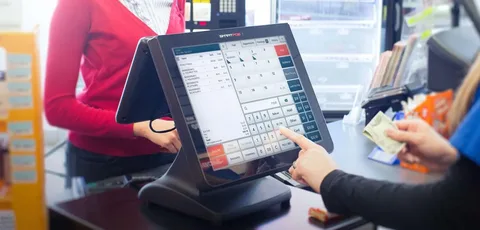Introduction
Running a successful mechanic shop is a complicated juggling act. You’ve been given clients with vehicle troubles, mechanics running their magic underneath the hoods, and a constant want to keep the right parts and components handy. That’s where a mechanic shop POS system comes into play. Imagine having a trusty assistant who can hold your stock prepared and ensure you by no means run out of crucial components while providing you with real-time updates. It’s like having a supercharged toolbox for your enterprise.
This manual will discover how a mechanic shop POS system can be your ultimate wingman when coping with your inventory. From helping you keep correct stock levels to supplying insights that can enhance your bottom line, this system is a sport-changer in your mechanic shop. So, allow yourself to dive in and discover how it can make your life as a store owner an entire lot less complicated. Simplifying inventory control in a mechanic store with a Point of Sale (POS) gadget may be a recreation-changer to your commercial enterprise.
Key features Point of Sale (POS) for inventory management
Real-Time Inventory Tracking:
The capability to tune inventory stages in real-time, supplying accurate facts on available elements and materials.
Barcode Scanning:
Support for barcode scanning to hurry up statistics entry and item retrieval, lowering guide errors.
Categorization and Organization:
The potential to categorize and organize inventory objects by way of kind, brand, or feature for easy retrieval.
Reorder Point Management:
Set and control reorder factors for every object in your stock, triggering automatic buy orders or signals while inventory falls below a special threshold.
Supplier Integration:
Integration with providers or distributors to get admission to price and availability data and the functionality to locate orders directly from the machine.
Sales and Usage Reports:
Detailed reporting capabilities provide insights into which elements are selling nicely and which can be sluggish-transferring, assisting with shopping decisions.
Multi-Location Support:
The mechanic shop POS system should centralize inventory control across all locations to ensure consistent and efficient aid allocation if you have multiple mechanic shops.
Access Control:
Users get entry to manage and permissions to limit the right of entry to stock management capabilities, safeguarding against unauthorized changes.
Returns and Warranty Tracking:
Tools for monitoring returns, warranties, and exchanges efficiently, allowing you to control defective components and cope with replacements successfully.
Employee Efficiency Tools:
Features that streamline the stock management method, permitting mechanics to focus on their middle responsibilities.
Cost Analysis:
Tools to help you examine the value of sporting inventory, include sporting fees, overstocking expenses, and misplaced sales because of stockouts.
Data Backup and Security:
Regular records backups to prevent loss due to machine failures and robust security measures to defend touchy inventory facts.
Scalability:
The ability to scale the device as your commercial enterprise grows and your inventory management needs to evolve.
Customer Relationship Management (CRM) Integration:
Integration with CRM software to track customer options and parts they often request.
Historical Data Storage:
The functionality to store historical information allows you to research traits, seasonal variations, and purchaser preferences.
Mobile Access:
Access to inventory records from cellular devices for on-the-pass management and ordering.
Customizable Notifications:
Configurable indicators and notifications for low-stock tiers, expired components, or essential occasions.
Integration with Accounting:
Integration with accounting software to ensure that inventory transactions are as they should be meditated in economic statements.
Offline Mode:
The potential to continue working on inventory management even when the net connection is quickly unavailable.
Training and Support:
Access to schooling substances and reliable customer support for troubleshooting and help while wanted.
See Also: Small Business Statistics!
Industries For Mechanic Shop with a POS System
Automotive Repair and Service Centers:
The primary use case, where it helps manipulate spare elements and elements, tune inventory in actual time, and streamline the restore technique.
Auto Parts Stores:
To control stock, tune sales, and automate reordering techniques, improving the efficiency of element shops.
Motorcycle Repair Shops:
For tracking and coping with motorcycle parts and add-ons.
Fleet Management Companies:
To screen and preserve car components and supplies for a fleet of motors.
Construction Equipment Repair:
For production corporations and restore shops coping with heavy equipment and devices.
Agricultural Machinery Repair:
Restore offerings for farms and agricultural equipment.
Boat and Marine Repair:
Control components and substances for boat restoration and upkeep.
Small Engine Repair:
For corporations specializing in restoring lawnmowers, turbines, and other small engines.
Aviation Maintenance:
The inventory of aircraft components and resources is essential for protection and operational performance in the aviation industry.
Manufacturing and Production:
To control the spare components and components required for manufacturing techniques.
Electronic Repair Services:
For repair stores handling digital gadgets and additives.
Heavy Equipment Rental Companies:
To screen and preserve heavy systems and machinery stock.
Retail Stores:
Any retail store with a want for advanced inventory control, together with electronics, home equipment, or specialized retail.
Wholesale Distributors:
Businesses that distribute merchandise need green inventory management.
Marine Equipment Stores:
Retailers focusing on promoting marine devices and accessories.
General Retailers:
Businesses with complex inventory wishes, mainly people who promote an extensive range of merchandise, can take advantage of these systems.
Garages and Workshops:
Not restricted to automotive invoice software repair, but also for popular renovation and restoration facilities.
Hospitality and Restaurants:
To manipulate food and beverage stock, helping in fee control and ordering elements.
Medical Equipment and Supplies:
To music scientific equipment, consumables, and medicines.
Educational Institutions:
Schools and universities can use such structures for monitoring and handling instructional substances and devices.
Conclusion
A mechanic shop POS system can be your great ally in the fast-paced international of a mechanic save, in which each 2D counts. It simplifies stock control, satisfies your client, and guarantees your enterprise dashes. With actual-time monitoring, automated strategies, and insightful data at your fingertips, the street to success was plenty smoother. Embrace the energy of generation and watch your mechanic save and thrive.
FAQs
How does a Mechanic Shop POS System song inventory in actual time?
A Mechanic Shop POS System uses barcode scanning and automation to tune inventory in real time. Each time an element is used or bought, the gadget automatically updates the inventory to be counted, ensuring accuracy and well-timed reordering.
Can I integrate a Mechanic Shop POS System with my component providers?
Yes, most POS structures for mechanic stores offer provider integration.
This permits you to get the right of entry to rate and availability records directly or even region orders from the device, streamlining the procurement technique.
What type of assistance and schooling should be had for using a POS device?
Many POS gadget providers provide educational materials and customer service to help you use the system efficiently. They can help with setup, troubleshooting, and any questions you might have as you integrate the device into your mechanic shop operations.




